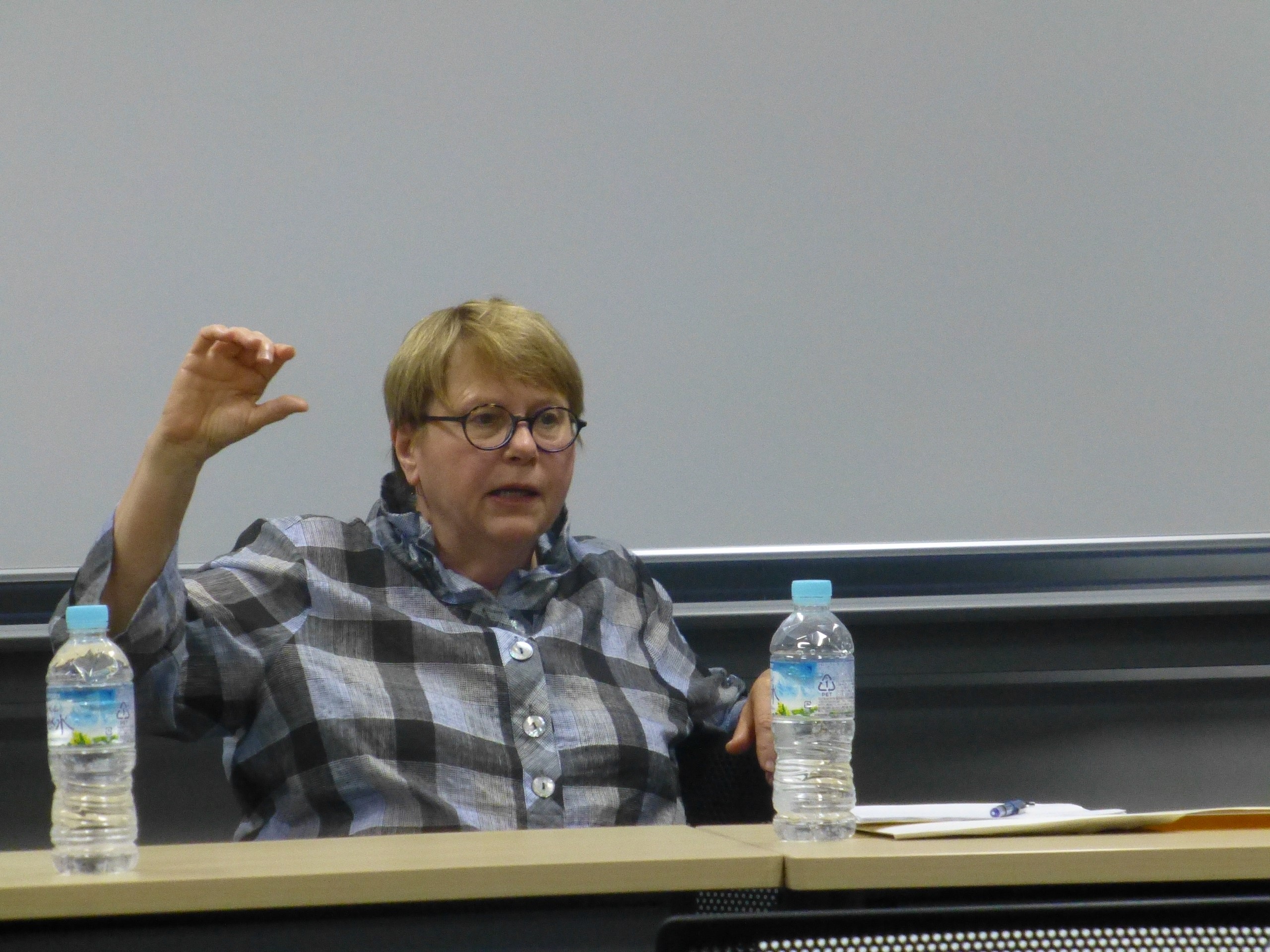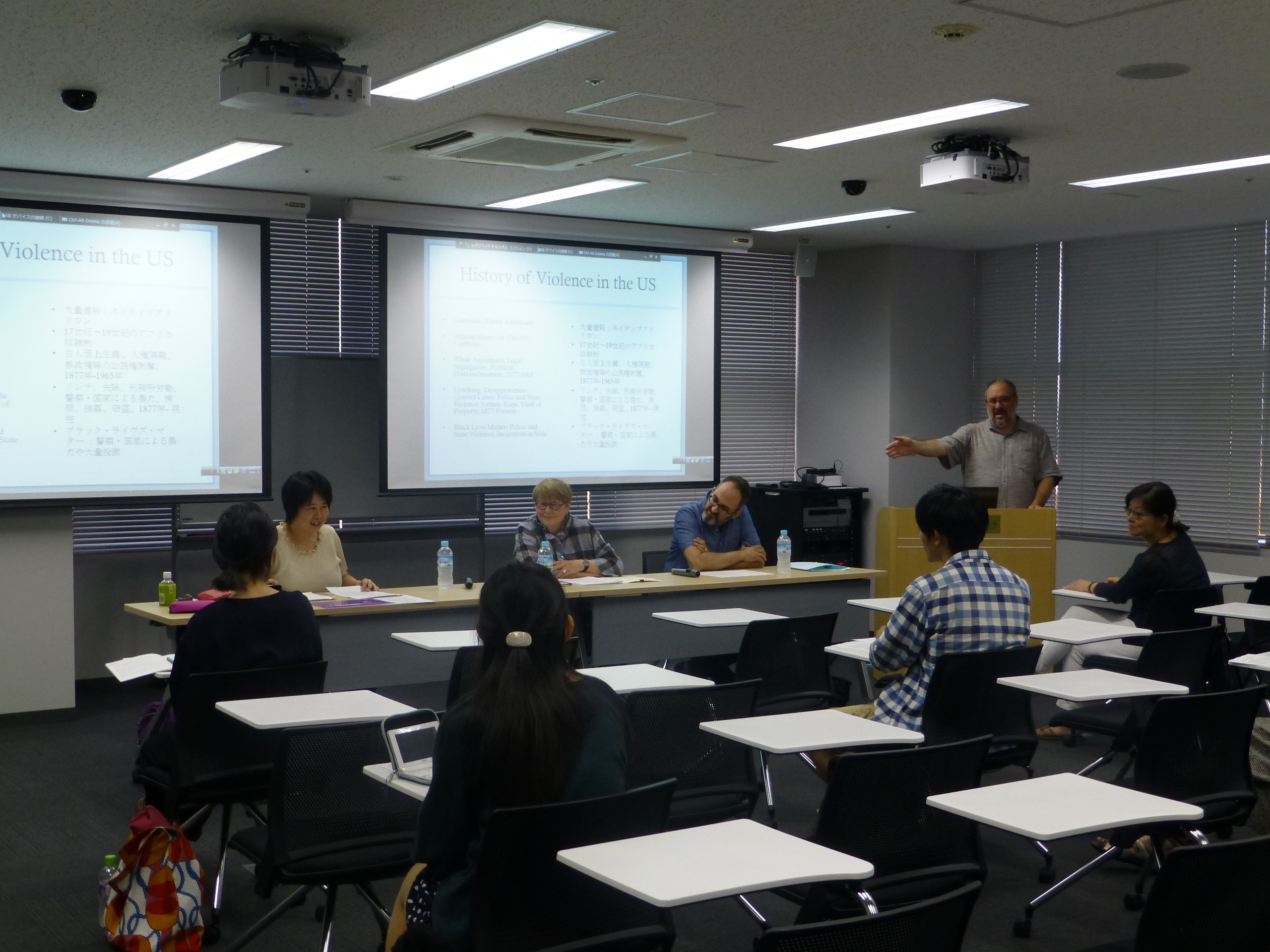講師 ナン・エリザベス・ウッドラフ(米国ペンシルベニア州立大学歴史学部教授)
広島平和研究所では、下記のとおりHPI研究フォーラムを開催しました。


1. テーマ
「連綿と受け継がれる暴力と生きる―現代の米国南部における歴史、記憶、トラウマ」
2. 日時
2017年5月30日(火) 18:00~20:00
3. 場所
広島市立大学サテライトキャンパス セミナールーム2
広島市中区大手町4-1-1 大手町平和ビル9階 (市役所本庁舎向い)
4. 講演の概要
公民権運動におけるアフリカ系アメリカ人に対する暴力と恐怖については、未だに語られず人々のトラウマとなって埋もれているものがある。1966年にグレナダの町で起こった出来事もそのひとつである。主に女性や子供からなる300~600人の黒人の集団が、人種差別や政治的権利の剥奪の撤廃を要求しながら4ヶ月間も町を行進し続けた。しかし、彼らが遭遇したのは、鉄パイプ、ガラス瓶、レンガ、ナイフや銃を振り回す700人もの白人暴徒だった。そうした黒人に対する暴力に、当時の地元警察も加担した。
今回の講演では、オーラル・ヒストリー(口述記録)を通じて、かつてこの出来事に巻き込まれた黒人たちが語ることのなかった数知れない痛みと苦闘の歴史について、人々が耐え忍んできた個々のトラウマと彼らがいかに出来事の記憶に向き合うことを拒絶してきたかなど、ホロコーストの生存者にも通じる問題を解き明かす。
5. 講師の略歴
歴史学者。主な研究領域は、20世紀のアフリカ系アメリカ人史およびアメリカ南部の社会・政治史。著書には、20世紀前半におけるアーカンソーやミシシッピデルタ地域でのアフリカ系アメリカ人の自由闘争に焦点をあてた〝American Congo: The African American Freedom Struggle in the Delta″ (Harvard University Press, 2003)がある。同書は、2004年にマクレモア大賞とメンフィス大学ベンジャミン・フック・インスティチュートのソーシャル・チェンジ・ブック賞特別賞を受賞し、2012年にノースカロライナ大学出版会がペーパーバック版を出版した。論文も多数発表しており、複数の刊行物に掲載されている。現在執筆中の単著〝The Legacies of Everyday Struggle: History, Memory, and Trauma in Grenada, Mississippi in the Post Civil Rights Era(仮題)″は最終段階にある。
HPI Research Forum on May 30, 2017
〝Living with the Everyday Legacies of Violence: History, Memory, and Trauma in the Contemporary South″
By Nan Elizabeth Woodruff, Professor of Modern U.S. History and African American Studies, Pennsylvania State University
The Hiroshima Peace Institute held an HPI Research Forum as follows:
1. Topic
"Living with the Everyday Legacies of Violence: History, Memory, and Trauma in the Contemporary South"
2. Date and Time
May 30, 2017 (Tue.) 18:00-20:00
3. Venue
Seminar Room 2, Satellite Campus, Hiroshima City University
4-1-1 Otemachi, Nakaku, Hiroshima
9F Otemachi Heiwa Building
4. Capacity
40 people (first-come-first-served basis)
5. Abstract of the Forum
Untold incidents of horrific violence and terror against African Americans characterized the Civil Rights Movement. While scholars have correctly focused on the heroic “local people” who formed the backbone of the southern struggle, my lecture looks at the invisible, unprosecuted, un-remembered stories of people who remained in small towns where the traumas of the civil rights years remain buried in the lives and communities of those who risked everything to challenge white supremacy. My study focuses on the city of Grenada where one of the most violent episodes of the Civil Rights Movement occurred in the summer and fall of 1966. For the next four months, crowds of 300-600 black people, largely women and children, marched around the town square demanding an end to racial segregation and political disfranchisement. They were met by a white mob numbering as high as 700 people, brandishing pipes, glass bottles, bricks, knives, and guns. Children and teenagers suffered lacerated faces and skulls, broken teeth, broken limbs. Local law enforcement was complicit in the violence against black people, using tear gas to break up the marchers, sending hundreds of young people to jail where they encountered horrendous treatment.
Through oral histories, I hope to explain how the former children and their families have understood their involvement in this historic event, of how they have both remembered and forgotten their experiences, and of how the refusal of the city of Grenada to confront its past resonates in the political and social life of the community. Many silences and much pain surrounds the history of this struggle: silences within black families where no one discussed the struggle once it had ended, where many young people left, where men went off to Vietnam, where others suffered mental breakdowns, and where still others moved on as best they could. Their stories reveal the personal trauma that people endured over time and the ways that they have coped with the memories of those episodes. These stories reveal the disappointment and anger that many experienced when the movement ended, leaving many without decent jobs and a white community that sought to erase the civil rights struggle and white massive resistance. Many of these accounts echo those of Holocaust survivors who repressed their memories due to the severe trauma they had experienced.
6. Profile of Nan Elizabeth Woodruff
Nan Elizabeth Woodruff is a U.S. Social Historian with an interest in African American History and the social and political history of the U.S. South. Her most recent book, American Congo: The African American Freedom Struggle in the Delta (Harvard University Press, 2003), focused on the African American freedom struggle in the Arkansas and Mississippi Delta during the first half of the twentieth century. It received the 2004 McClemore Prize and Honorable Mention for the 2004 Benjamin Hooks Institute for Social Change Book Prize. The University of North Carolina Press released in 2012 a paperback edition of American Congo. Her articles have appeared in the Journal of Southern History, Radical History Review, and in Charles Payne and Adam Green, Time Longer Than Rope: A Century of African American Activism, 1850-1950, among others. She is completing a book on The Legacies of Everyday Struggle: History, Memory, and Trauma in Grenada, Mississippi in the Post Civil Rights Era. In 2014-2015, she held a residential fellowship at the National Humanities Center in the Research Triangle, NC.
